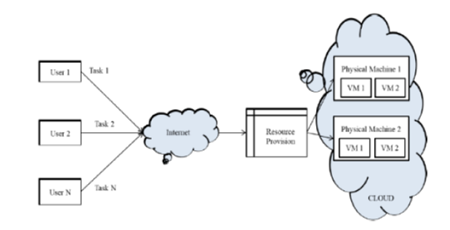


Indian Journal of Science and Technology
Year: 2022, Volume: 15, Issue: 2, Pages: 69-80
Original Article
Kavita D Hanabaratti1*, Sunil F Rodd2
1Assistant Professor, Department of Computer Science and Engineering, KLS Gogte Institute of Technology, Belagavi
2Professor, Department of Computer Science and Engineering, KLS Gogte Institute of Technology, Belagavi
*Corresponding Author
Email: [email protected]
Received Date:25 October 2021, Accepted Date:05 January 2022, Published Date:31 January 2022
Objectives: The objective of this model is to design a technique to schedule the workload for the computation of web services in the heterogeneous cloud environment. As the Web Service Composition (WSC) for the execution of scientific workload in a heterogeneous cloud computing environment is a challenging task. Modern workload requires dynamic resource provisioning technique as there exist parallelization among sub-tasks and different task demands different Quality of Service (QoS) requirement. Methods: This study presents an Evolutionary Computing based Web Service Composition (EC-WSC) technique to execute a large-scale scientific workload in a heterogeneous cloud environment. A multi-objective metric for improving energy efficiency and resource utilization is modelled. Then, an improved searching mechanism for the dragonfly evolutionary computing algorithm is modelled. Findings: Experiment outcomes show EC-WSC model attains superior performance in execution time performance analysis and energy efficiency performance analysis when compared with existing resource provisioning models of workload service composition such as Deadline and Budget-Aware Workflow Scheduling (DBAWS)(1), Evolutionary Computing Multi-objective optimization for Hybrid Clouds (EC-MOH)(2), Web Service Composition (WSC)(3), and Evolutionary Multi-Objective Optimization for clouds (EMOC)(4) in terms of heterogeneous computing, workload size, multi-objective optimization, QoS metric, and optimization strategy. Our model EC-WSC has proved to be more efficient in terms of energy efficiency by a reduction of 52.13% and also reduction in execution time by 71% when compared with the WSC(3) existing Web Service Composition model. Novelty: Existing resource provisioning predominantly focused on reducing computation cost and time; however, induces task execution latency and energy overhead. However, EC-WSC is modelled to utilize resources more efficiently and meet task QoS requirements by assuring energy minimization constraints.
Keywords: Cloud Computing; Heterogeneous Computing Environment; Multiobjective optimization problem; Resource Provisioning; Workload Scheduling
© 2022 Hanabaratti & Rodd. This is an open-access article distributed under the terms of the Creative Commons Attribution License, which permits unrestricted use, distribution, and reproduction in any medium, provided the original author and source are credited.
Published By Indian Society for Education and Environment (iSee)
Subscribe now for latest articles and news.